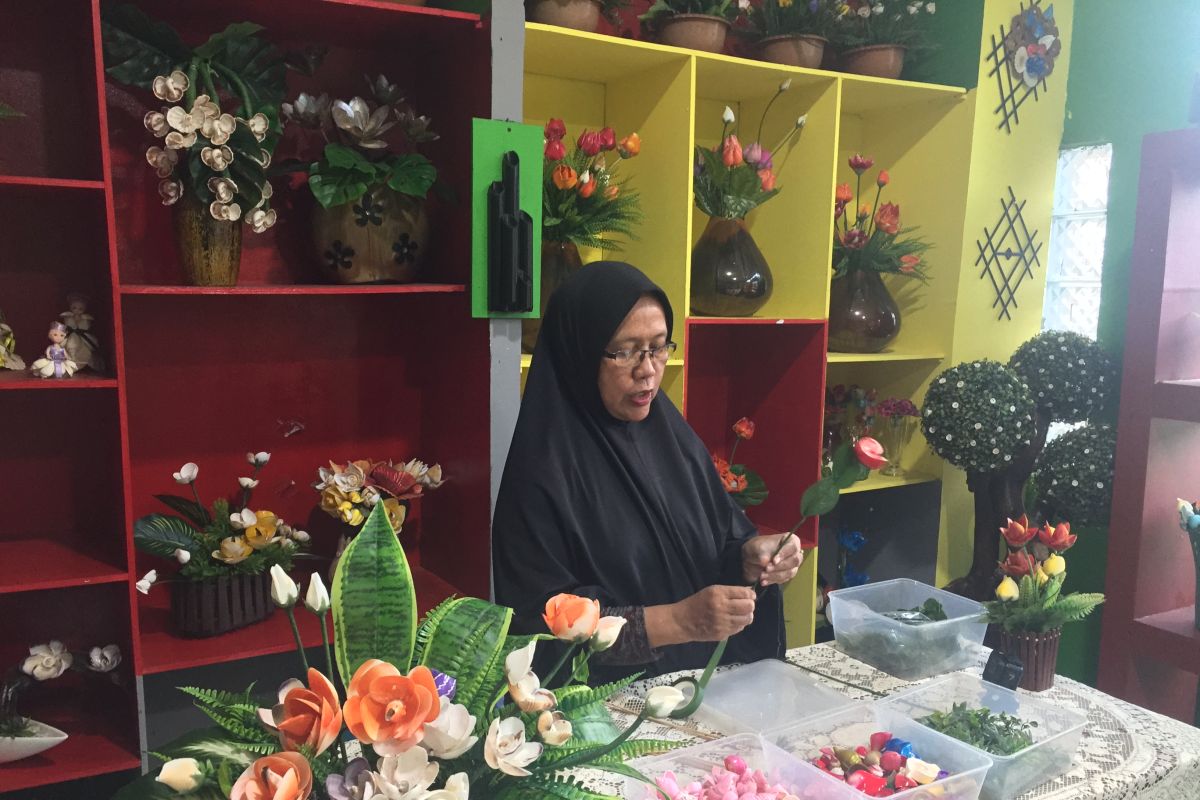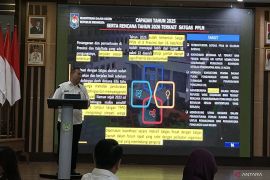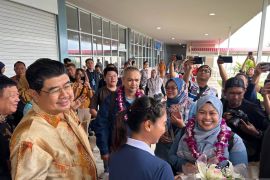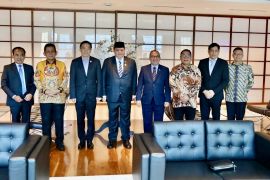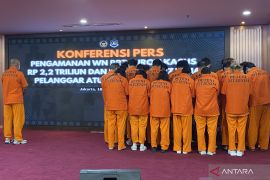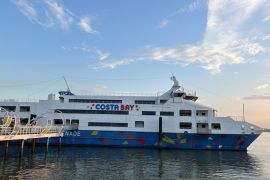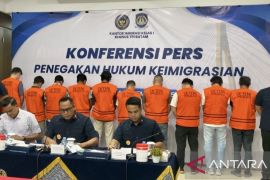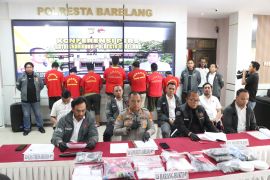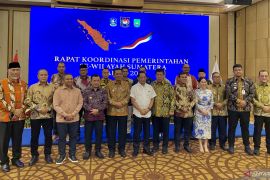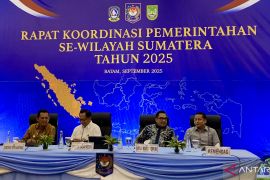As stated by Cooperatives and SMEs Minister Teten Masduki, a shift to green businesses can reduce the adverse effects of climate change, improve production quality, lower input costs, allow access to new markets, and enable the creation of new products or services.
In the 2022 Gernas BBI campaign, one of the creative SME players assisted by Riau Islands Bank of Indonesia, Suyanti Lelonowati, or Yanti, exhibited handicraft products made from dog conch (a type of shellfish) produced by processing marine waste.
She sells various types of products made of dog conch, such as flowers, flower pots, ornaments, necklaces, and crowns.
Her ability to process marine waste has been gained through a long-time habit.
At first, creating dog conch items was a private hobby for her. After meeting a friend with a similar hobby who pointed out its business potential, she became motivated to become a craftsperson as well as an entrepreneur for dog conch products.
Yanti finally decided to establish her business, called Rumah Keong (Snail House), in Batam on August 8, 2010, because she saw a business opportunity in selling dog conch products.
When she started the business, she did not have the tools to facilitate production. At the time, the Department of Fisheries and Maritime Affairs of the Riau Islands Province provided her the tools to assist the creation of these products.
Those tools helped her increase the production of dog conch crafts, so more and more people came to know about the product through word-of-mouth marketing. Yanti also introduced her homemade products to local agencies in charge of SMEs by submitting a catalog of her products.
Eventually, the marketing was done through various digital platforms such as Instagram, Facebook, and WhatsApp.
As a result, many customers from overseas have started to come to the dog conch production site in person to make purchases. Some of the buyers come from Malaysia, Brunei Darussalam, Thailand, and Denmark.
As for buyers from the domestic market, they mostly come from Surabaya, East Java. The prices of Snail House products range from Rp10 thousand for a flower made of dog conch to millions of rupiah for more complex products, such as bonsai trees made from dog conch.
She also received special orders from customers, such as for a one-meter barking Christmas tree worth Rp25 million, which was made out of three thousand dog conches in a week, and was requested by Batam Protestant Batak Christian Huria Church last year.
Yanti said that she could not herself believe she created the item. The item was perhaps the only thing of its kind in the whole world, which could be found in Batam.
The estimation of income earned when there are many buyers is Rp8 million per month on average. Earning that much has helped her immensely in meeting many needs, such as basic needs, and even enabled her to make a pilgrimage to Mecca for Umrah.
Apart from the income, she has also formed relationships with national and regional entrepreneurs who have inspired her to develop her business.
In terms of capital, at first, she only needed hundreds of thousands to produce the items because raw materials could be easily found on the beach. The raw materials were collected by the wives of the fishermen who volunteered to be suppliers for the Snail House.
Raw material supplies were also sourced from interns at a number of restaurants. They collected dog conches from their workplace waste, which they later sold to Snail House to earn additional income.
During the COVID-19 pandemic in 2020, her business saw a drastic decline to 0 percent.
In order to survive and keep the Snail House going, Yanti sold flowers planted on the terrace of the gallery where she works. It enabled the business to continue, and the Snail House could reopen as per usual this year.
Yanti was also the administrator of the Batam National Crafts Council in the creative and competitive section for two periods, that was from 2011 to 2021.
In her capacity as an expert in making dog conch-based crafts, the Batam woman provided free training to women from her neighborhood.
Training was also provided at the National Narcotics Agency Correctional Institution (BNN Lapas), private schools, and to SMEs assisted by the Batam Marine and Fisheries Office.
Another SME assisted by Bank of Indonesia in Riau Islands that will appear at the 2022 Gernas BBI exhibition is Isna Puring, a water hyacinth craft business owned by Tisnawati, which won in the environmentally friendly craft category in the program.
She started the water hyacinth business in 2013 because she recognized the great potential of the plant to be used as a raw material for creative products.
Tisnawati's business received assistance from the Regional National Crafts Council and the Batam City Cooperatives and Micro Business Office, which provided business permits and training.
The local municipal government pushed water hyacinth products through the provision of facilities, and the products are slowly being recognized by the public by word of mouth and have reached the digital space.
“Foreigners know our products from Google Business, WhatsApp Business, Shopee, and Bukalapak. We have resellers from Singapore and Malaysia, so every month we definitely send products there," she said in Riau Islands, Batam, on Friday (April 1, 2022).
Thanks to digitalization, consumers from overseas have begun to buy various types of water hyacinth products, whose prices range from Rp30 thousand to Rp2.5 million. These include flower pots, tables, and chairs.
Requests have also been coming from the United States, which was the initial importing country for Isna's water hyacinth craft products. Not to mention Isna Puring's involvement in various exhibitions in Singapore, Malaysia, Japan, Jakarta, and Bandung, which have promoted the expansion of Indonesia's export contribution and product distribution in the domestic market.
Usually, buyers request displays of water hyacinths to be installed in cafes, restaurants, and hotels as decorations, Tisnawati said.
The profit from the sales are quite huge, thus enabling her to assist the surrounding community, she added.
Regarding the initial capital needed, Tisnawati said that she only needed Rp500 thousand because the raw materials could be obtained for free from 12 lakes in Batam.
When the COVID-19 pandemic broke out in Indonesia, sales of water hyacinth crafts actually increased by 40–50 percent, particularly flower pot products, with 1,500 units sold.
She also trained aspiring water hyacinth craftsmen along with the Batam city government. She also recruited people who could produce good quality water hyacinth products.
Tisnawati, whose nickname is Isna, urged people to go back to nature, use environmentally friendly products, since plastic has already been used a lot, for the sake of the next generation's future.
Fellow SME players who implement green businesses are showing concern for the future by reducing the negative impact of waste on the climate. The use of very cheap raw materials also highlights that businesses based on environmental sustainability only need a small amount of capital.
Expectations from the government
Yanti admitted that she had not received assistance from the Batam city government even though she had received it from the Riau Islands provincial government.
She said she expected that future generations would take part in this business as well because there is still a lot of dog conch waste piling up on the beaches.
The Education Office was able to provide guidance to young people who have crafting talents in order to instill confidence in them to process and use local products.
Yanti also wished for the government to develop MSMEs by facilitating local creative actors to face various challenges faced by them in order to encourage public prosperity.
She also urged the government to provide coaching to people who have crafting talent and are willing to work. Also, facilitating SMEs to make it easier to sell various local products, such as requiring every hotel in Batam to buy products from them.
By doing those, she believes that the target of pursuing the advancement of the creative economy sector in Batam would be achieved.
Tisnawati expressed her utmost appreciation for the Batam city government for providing support in business development.
She said she expected the city government to encourage creative products, especially in the culinary, craft, and fashion sectors, to make Batam MSMEs as great and competitive as those in other regions.
Related news: SOEs Ministry supports MSMEs in Malang to maximize digital technology
Related news: Jokowi targets 20 million MSMEs to leverage e-commerce by 2022
Editor: Rahmad Nasution
Copyright © ANTARA 2022
